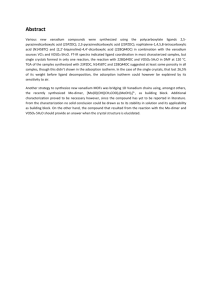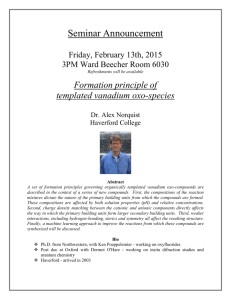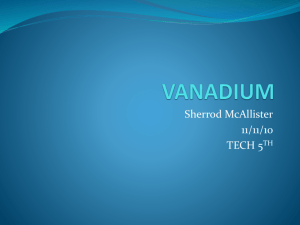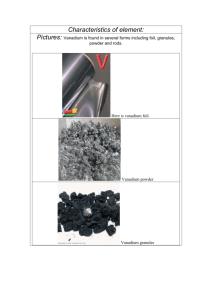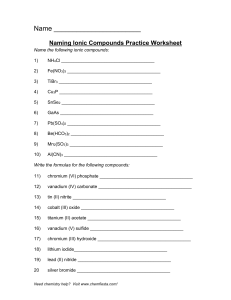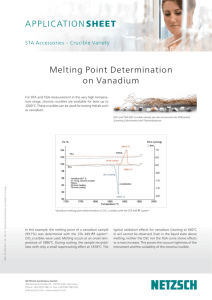Vanadium in Biology and Medicine B Y
advertisement
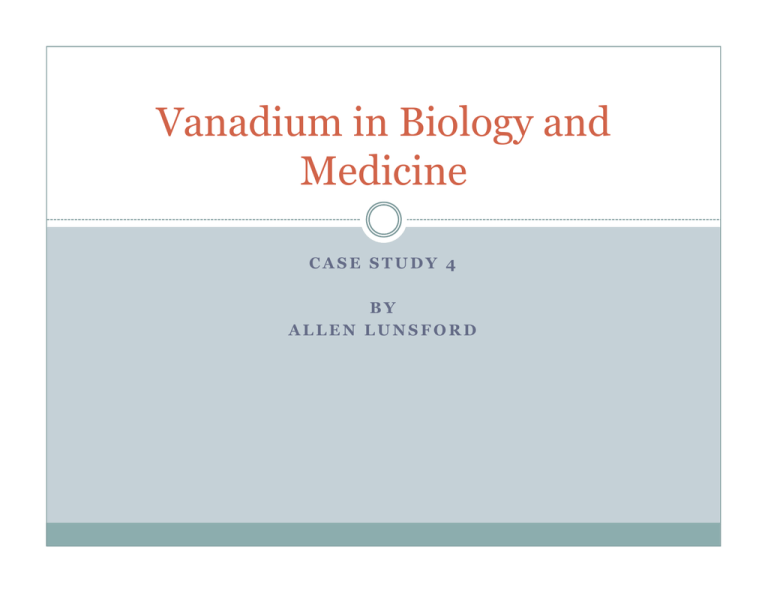
Vanadium in Biology and Medicine CASE STUDY 4 BY ALLEN LUNSFORD Overview y Vanadium Chemistry y Peroxidases y Insulin Activity y Vanadium as a mimetic Vanadium y Oxidation States from the -1 to the +5 but the major y y y y ones to us are the +3, +4, +5 In higher oxidation states has an affinity for nitrogen and oxygen donors which can be explained by HSAB Usually has vanadyl in synthetic drugs (V=O)++ Solutions are a green color Essentiality determined in 1973 through studies of rats but still uncertain in humans Vanadium Continued y Paramagnetic y d1 configuration y Nuclear spin of 7/2 EPR 1.20E+04 1.00E+04 VO(bme-dach) 8.00E+03 6.00E+03 4.00E+03 2.00E+03 0.00E+00 ‐2.00E+03 ‐4.00E+03 ‐6.00E+03 ‐8.00E+03 2500 3000 3500 4000 4500 Catalog Sources of Vanadium VIV Cl Cl Vanadocene Biscyclopentadienyl Vanadium(IV) dichloride VIIIX3 IV 2Vanadium halides [V ═O][SO4] x (H2O)4 Vanadyl sulfate VIII(acac)3 acac = acetylacetonate VVOCl3 Vanadium(V) trichloride oxide Vanadyl Ion y The vanadyl ion is one of the most stable diatomic ions y Can be explained by HSAB y Blue solid and most common source of vanadium in the laboratory y Oxidation state of +4 y Present in all of the haloperoxidases and most synthetic vanadium drugs Haloperoxidases y Enzymes that catalyze the oxidation of a halide by hydrogen peroxide y Chloro, Bromo, Iodo peroxidases y Three types: heme group, vanadium, “metal free” y First time vanadium was seen as a cofactor Cofactor y Commonly referred to as “helper molecules” y Bound to the outside of a protein y Required for enzyme activity Haloperoxidases Continued - + y See the conversion of X to X followed by halogenation of the organic molecule or formation of singlet oxygen R H + Cl– + HO OH VCPO R Cl + 2H2O y Vanadium is in the +5 oxidation state y Big deal in industry because of mild conditions Haloperoxidase in Nature y Found in humans in the thyroid as thyroidperoxidase and saliva as lactoperoxidase y Found in white blood cells as myeloperoxidase and eosinophilperoxidase y Also found in marine algae y Sea urchin eggs Structure of Haloperoxidase y Trigonal Bipyramidal y Bound to one histidine y Bound to at least 3 oxygen atoms and in most cases 4 although sometimes an azide y Structure of lactoperoxidase Binding to Protein y Hydrogen Bonding to the protein y Keeps the vanadium in place y Easy hydrogen bonding to oxygen y Structure very close to phosphatases (Top is VCPO) y Idea is that vanadium inhibited phosphatases act as haloperoxidases in the presence of hydrogen peroxide Proposed Mechanism y Center is two histidines y Hydrogen peroxide protonates y y y y the oxygen and adds to vanadium Loss of 2 waters with the chloride opening the ring Water adds with a proton and the HOCl leaves Halide doesn’t add to vanadium Can produce singlet oxygen Synthetic Analogues y Act as functional models for vanadium peroxidases y [VO(O2)Hheida]y In acetonitrile, works well to catalyze the addition of the halide y NO6 Wrapping up Peroxidases y Potentially used to oxidize sulfides to sulfoxides y Peroxidase from bacteria and algae was used to test this idea y Assuming that this halogenation process is required in the body then this is the first time vanadium is established as a required metal Inhibition of Phosphorylation y Phosphatases catalyze the hydrolysis of phosphate ester bonds. Removes a phosphate group y Likely to be important to the insulin like activity of vanadium y Phosphatases are inhibited by oxometalate anions such as vanadate, arsenate, tungstate y Transition State Analogue Transition State Analogues y Compounds with chemical structures similar to the transition state of the substrate y Inhibit the active site of the enzyme y As seen below the substrate fits perfectly. Vanadyl is able to substitute for phosphate in the perfect fit. Might not be able to leave after being modified Vanadium as Insulin Mimetic y Known since the 1980’s y Diabetes patients have abnormal glucose and lipid metabolism y Normally treat with increased insulin levels y Vanadium compounds alleviate the symptoms of diabetes and enhance the action of insulin Diabetes/Insulin action y Type I- Doesn’t produce enough insulin y Type II- Insulin resistance y Signaling action of insulin in the body is still not known completely y Vanadium compounds look at type II diabetes Insulin Activity y Secreted by the pancreas after uptake of food y Increased insulin promotes uptake of glucose by the liver and gut as well as peripheral tissue y This results in energy production Signaling y Insulin binds to the cell membrane at the insulin receptor which promotes uptake y This sets off a series of phosphorylation steps which can be substituted by, and are very sensitive to, vanadium y Led to increased insulin levels and to obesity resistance y Resistance to insulin by the receptor leads to type II diabetes Compounds/Requirments y Oxidation state not as critical although most are in the +3, +4, +5 due to standard conditions in the body y Potency depends on the ligands attached y Ligands must be thermodynamically and hydrolytically stable in water y Administered orally (water soluble, neutral charge) y No toxic biological products y Must be able to cross lipid interfaces in cells BMOV y Bis(maltolato)oxovanadium(IV) y Oxygen-rich ligands tend to be water soluble y Square pyramidal complex y Dosage of 0.4 mmol/kg per day y Passed first phase of clinical trials and given in drinking water y 50% glucose lowering Clinical Trial Phases y Phase 0- Too low to do any good. Goal is it see if it y y y y acts the way it should in the body Phase I- (20-100 people) Assess safety and tolerability under a physicians sight to see side effects Phase II- (more people) Goal is to see if the drug does what it says it does (failure occurs here) Phase III- (300-3000 people) Random people Phase IV- On going investigation to make sure it works Synthesis y Very simple and in high yield y Vanadyl sulfate is added to two portions of Maltol (bottom right) y A base is used to deprotonate the OH group y Maltol is approved as a food additive in USA Other Compounds y Other vanadium compounds looking at testing but have been inferior to BMOV Toxicity y Failure to gain weight y Gastric irritation due to poor absorption y Green tongue y No evidence to show that increased storage in bone is harmful y Deprivation increase thyroid weight
